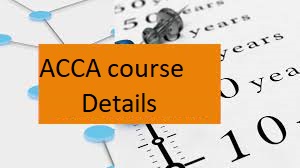Unveiling the Path to Success: Exploring ACCA Courses and Course Details
Introduction
In today's competitive world of finance and accounting, acquiring the right qualifications is essential to stand out in the job market. One such qualification that holds significant prestige is the Association of Chartered Certified Accountants (ACCA). This blog is your comprehensive guide to ACCA courses, as well as a deep dive into ACCA course details, offering insights to help you chart your course toward a rewarding career in accounting and finance.
Chapter 1: The ABCs of ACCA
Before we delve into the specifics of ACCA courses, it's crucial to comprehend what ACCA represents. ACCA, which stands for the Association of Chartered Certified Accountants, is a globally recognized professional qualification. It equips individuals with the skills and knowledge necessary to excel in various accounting and finance roles. ACCA's reputation is highly regarded among employers worldwide, making it a highly sought-after credential for those seeking a successful career in accounting.
Chapter 2: The ACCA Course Structure
ACCA's comprehensive course structure is divided into two main parts:
ACCA Applied Knowledge: This initial part comprises three papers that lay the groundwork in accounting and finance. It covers subjects like Accounting in Business, Management Accounting, and Financial Accounting.
ACCA Applied Skills: The second part builds upon the knowledge gained in the first part, featuring six papers that delve deeper into subjects such as Corporate and Business Law, Performance Management, Taxation, and more.
Chapter 3: The In-Depth ACCA Course Details
Now, let's dive deeper into the specifics of ACCA courses, recognizing that these details may vary depending on the learning provider and study mode:
Study Options: ACCA offers flexibility in terms of study modes. You can choose between full-time, part-time, or online courses to accommodate your schedule and preferences. Numerous universities, colleges, and online platforms offer ACCA courses, giving you the freedom to select the most suitable option.
Course Duration: The duration of ACCA courses can vary. Generally, it takes around 2-3 years to complete the qualification. However, this timeline can be influenced by your own pace of study and whether you decide to tackle multiple papers concurrently.
Examination Format: ACCA exams are conducted twice a year, typically in June and December. These exams can be taken either in a paper-based format or as computer-based exams, depending on the paper and your location.
Course Materials: ACCA students receive a wealth of study materials, including textbooks, practice questions, and access to online resources. These materials are carefully designed to support your learning journey and enhance your preparation for the exams.
Chapter 4: The Benefits of Pursuing ACCA
Pursuing an ACCA qualification offers a multitude of advantages:
Global Recognition: ACCA's global recognition opens doors to international career opportunities, allowing you to work across borders and cultures.
Diverse Career Options: ACCA-qualified professionals are equipped to excel in various sectors, including auditing, taxation, finance, and consulting.
Competitive Edge: ACCA equips you with the skills and knowledge necessary to stand out in a competitive job market.
Lucrative Opportunities: ACCA credential holders often enjoy competitive salaries due to their specialized expertise.
Chapter 5: ACCA Course Details - Entry Requirements
To embark on an ACCA course, you'll need to meet specific entry requirements, which may vary slightly among institutions. Typically, these prerequisites include:
Educational Background: Most institutions require a minimum of two A-levels and three GCSEs (or equivalent qualifications) in five distinct subjects, including English and Mathematics.
English Proficiency: If English is not your native language, you may need to demonstrate English language proficiency through exams like IELTS or TOEFL.
Foundation Level: If you do not meet the academic requirements, you can initiate your ACCA journey with the Foundation Level and progress toward the full qualification.
Chapter 6: Preparing for ACCA Exams
Succeeding in ACCA exams requires dedication and a well-thought-out strategy. Here are some valuable tips to help you excel:
Create a Study Schedule: Develop a structured study plan, allocating sufficient time for each paper.
Practice Past Papers: Solving past exam papers helps you become familiar with the exam format and pinpoint areas that need improvement.
Join Study Groups: Collaborating with peers in study groups or online forums can provide additional support and diverse perspectives.
Stay Informed: Keep abreast of evolving accounting and finance regulations and standards, as ACCA exams often reflect current industry trends.
Conclusion
Pursuing an ACCA qualification can be a transformative step towards a rewarding career in finance and accounting. This guide has provided you with a comprehensive overview of ACCA courses and in-depth ACCA course details, equipping you with the knowledge to make informed decisions about your educational and career journey. Whether you're a recent graduate or a working professional seeking to enhance your skills, ACCA offers a pathway to a brighter future in the realm of accounting and finance.


Comments
Post a Comment